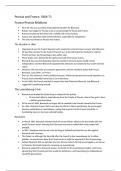Prussia and France, 1866-71
Franco-Prussia Relations
All in all, this was a positive international situation for Bismarck.
Britain was happy for Prussia to be a counterweight to Russia and France.
Russia was pleased that they had a reliable ally versus Austria.
Austria was absorbed with internal division, especially the Hungarians.
The only real threat to Prussia was France.
The Situation in 1866
Napoleon III was the French Emperor who wanted to restore France’s power and influence.
He had been neutral in the Austro-Prussian war as he had hoped to mediate or expand
French territory by threatening to join either side.
These hopes were dashed by the speed and scale of Prussian victory.
Bismarck then assured Napoleon that the southern German states would remain
independent, but then Bismarck expanded the zollverein to include the four south German
states.
However, this was only an economic agreement, and the southern states didn’t trust
Bismarck, each other, or France.
Even so, this hinted at a more unified Germany, which threatened and scared Napoleon, as
Prussia now controlled more than 2/3s of Germany.
In July 1866, the French wanted to expand into the Rhineland (Bavaria), but Bismarck
suggested Luxembourg instead.
The Luxembourg Crisis
Bismarck persuaded the Dutch king to relinquish the dutchy.
o Prussia had rights in Luxembourg from the Treaty of Vienna, where they got to have
a military garrison there.
At the end of 1866, Bismarck no longer felt he needed to be friendly towards the French.
So, after saying to France that it was okay for them to take Luxembourg, he encouraged
German nationalism in Luxembourg, saying that to give it to the French would be ‘a
humiliating injury to German national feeling’.
Resolution
In March 1867, Bismarck released texts of secret military alliances he had made with the
south German states, showing that Germany was more unified that most people had
thought.
In 1867, Napoleon tried to win over the king of Holland and tried to turn him against
Bismarck and Germany.
This failed, as although the King did offer the French to buy Luxembourg for 5 million
guilders, he would only allow the French to do so with the approval of the Prussian king.
Indeed, Bismarck did use patriotic German fervour (which he had encouraged) as an excuse
to threaten the Dutch king into not giving up Luxembourg.
Bismarck appealed to the great powers to decide on the Luxembourg matter, and it was
agreed that the Prussian garrison would be withdrawn, and Luxembourg’s independence
would be guaranteed.
, Although this seemed like a compromise, it was in fact a heavy blow for Napoleon and there
was no territorial gain for France.
The Results of the Luxembourg Crises
Franco-Prussian relations were damaged.
However, there was still no franco-Austrian alliance.
Although his use of nationalist sentiment would suggest otherwise, Bismarck was
only using German nationalism to increase Prussian influence over the rest of the
German states and as a way to threaten France.
He had no ‘master plan’ for unification, but a war with France would speed up
unification as it would be popular in Germany, but only if France was seen as the
aggressor.
The Road to War
In 1879, Bismarck found opportunities to provoke France and bring about war.
The Hohenzollern Candidature
In 1868, queen Isabella of Spain was deposed by a liberal revolution.
In February 1870, Spain asked Prince Leopold of Hohenzollern to accept the Spanish throne.
Leopold’s father asked the head of the family if this was acceptable – the head of the family
was the Prussian king, William I.
o Leopold didn’t want to be king of Spain, and neither did king William, who thought it
might provoke a war with France.
Bismarck convinced the Hohenzollern family to accept and sent money and envoys to Spain
to push Leopold’s case.
Details of this leak out to the French.
The Ems Telegram
The French Foreign Minister Gramont was furious and saw an opportunity to strengthen
Napoleon’s position with a victory over Prussia.
The French ambassador went to Ems to demand that King William backed down.
William didn’t want war, and so told Leopold to withdraw his candidature – this annoyed
Bismarck.
But, Gramont demanded an official renunciation of the claim to the Spanish throne ‘for all
time’.
William was insulted and refused politely.
As was standard practice, a telegram reporting the conversation was sent to Bismarck to
read before it was released to the press.
Bismarck, who at the time was having dinner with Moltke and Roon, edited the telegram
down to make the telegram, and the actions of the French ambassador, seem very insulting.
Bismarck ensured that the telegram was published in the press – it was also published in
France on Bastille Day.
The French declared war on Germany soon after.
The Franco-Prussian War 1870-71




